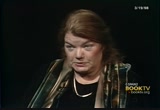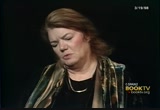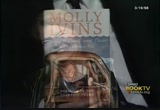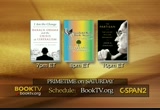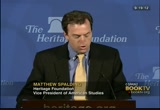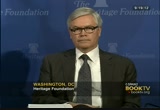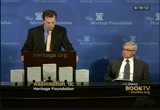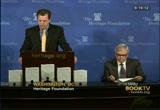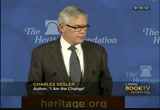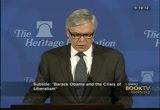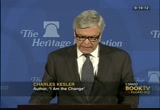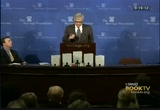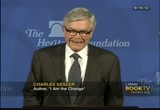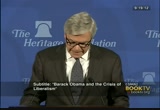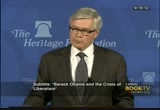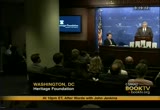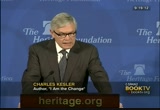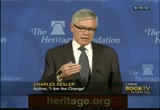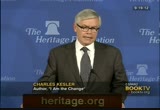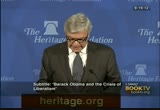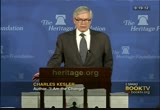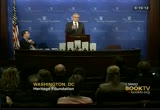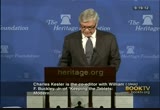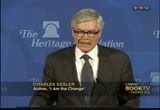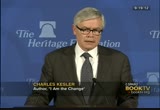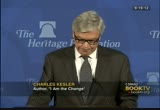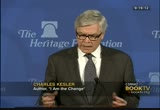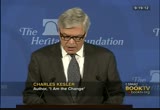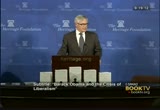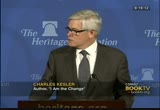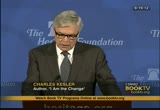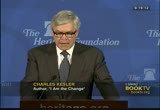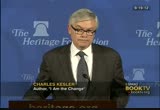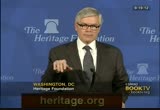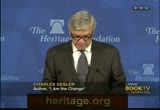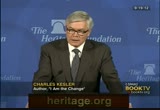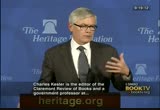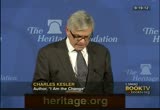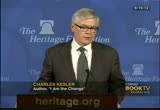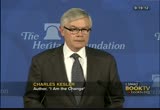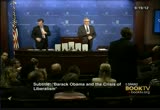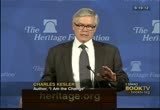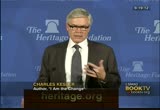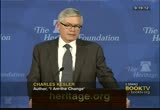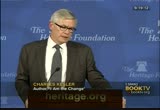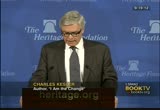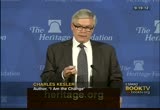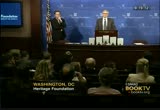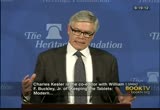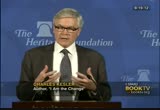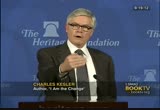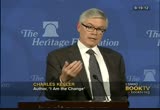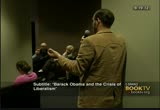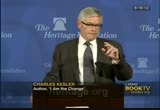tv Book TV CSPAN October 6, 2012 7:00pm-8:00pm EDT
7:00 pm
the police of vinton, louisiana, even more. and so i'm addressing this phenomenon by saying, 'you know, i do not believe it was the lord who told them to do that.' there is this fella who runs around impersonating the lord, and many a time people will tell you, 'god told me to do this,' but it's that fella who impersonates the lord. it's not the lord at all. it's a real problem. c-span: now you say that today's politicians are blow-dried, priggish, goody-two-shoes suburban bores. >> guest: i find that all too often, especially those guys--have you noticed how often people who used to be television weathermen now run for public office? they all have really good hair and no brains. now i don't mean to put down weathermen as a class, but i'm sure there are redeeming ex--exceptions among the weathermen of the nation. but i just am speaking of a--of a common kind of weatherman. i find more and more that people who go into politics seem to me to--somehow they don't have much
7:01 pm
depth, they don't have much fire. they--they--lord only knows what makes them run. c-span: you say, 'i'm the world's leading authority on blue-bellied, walleyed, lithium-deprived texas lunatics.' >> guest: there was a remarkable week in my life when a bunch of texas lunatics holed up out by ft. davis, texas, and demanded that texas be allowed to secede from the rest of the country, and it touched off quite a media storm around the world. and as the resident authority on texas lunatics, there i was getting telephone calls from places like bombay, 'miss ivins, this is bombay times calling. can you explain, please, the people in the ft. davis?' and i was, 'yeah, i can explain them. they are just crazier than shithouse rats.' c-span: on that note, we're gonna call this quits. molly ivins is our guest. here's the book, "you got to dance with them what brung you:
7:02 pm
7:03 pm
weekly "of a words program ." the partisan. visit booktv.org for more on the weekend's television schedule. from the heritage foundation in washington, d.c., conservative scholar charles kessler presents the thought on presidency and what he deems are the quote, fatal contradiction, end quote, of liberalism. he was there for about an hour. >> good evening. i'm matthew, vice president of american studies here at the heritage foundation. we are in for a real treat. here we are approaching election. which pretended to be a water shed, recognized by both political parties as turning point. a change debate about the role of government, free market to the future trajectory of our
7:04 pm
nation. in that debate, campaign commercials and political rhetoric abound. sound bytes, daily reactions dominate the news cycle. luckily for us in the miss -- mist of this a serious thinker wrote a serious book. having been discovered by william f. buckley and grown up writing and reading for national review and overcome the education at harvard university and the upbringing in west virginia, he it a touring figure of the conservative movement. rightly sew. a professor of government the the clare month college. he's the coed or it with william f. buckley of keeping the tablet of modern american conservative thought. he is written extensively on american constitutionalism and political ideas. indeed the addition nat federalist paper the one published -- is the best selling
7:05 pm
edition in the united states. he can contributes regularly to the opinion pages of the "the wall street journal," "los angeles times," writes about flicks, and -- politicking and national review among other journals. he's a senior fellow at the claire monththe mission to e ree the principles of the american found ming is the intellectual muscle of the i guess -- mission pings. he teaches in the key fellow programs. the fellows program and the lincoln fellows program. most important he's the editor of the clermont review books. a public cage of the clermont substitute. i encourage you to sib croib. it is the most eloquent and well
7:06 pm
written attract review of books published in the united states and it is so because it is edited by chairmans kessler. he's been thinking, teaching and write l for conservativism for some time. and he is now down having very liberal if not revolutionary which say he's written a book largely based on president obama's writing speeches and interviews. and set out to understand an explain him as he understands andings explains himself. as a result he's come to the conclusion that it turns out that liberals don't understand president obama and neither do conservatives. the result is the most serious and provocative assessment yet of modern american liberalism. "i am the change" barack obama and the crisis of liberalism. this is a bock that should, i believe will transform the left and the right understanding of modern liberalism, how we look
7:07 pm
at the past, the present, and as we shall see its future. so suppose join me in wrking a dear friend of the heritage and a dear frefned mine and my teachers chaster charles kesler. >> [applause] thank you. they would have properly discounted your warm praise of me if you mentioned you were my student at the beginning instead of at the end. it is a always a pleasure to be here. matt's stewardship of the american studies here has been stellar. and it's heritage now speaks out on a variety of philosophical as well as practical questions of the day in a way that has changed the conversation in washington. it's also always an honor for me
7:08 pm
to be here in this house that ed build ed fuller in, who is one of the great figures modern conservativism and he really built this place. he did build it. [laughter] from nothing and in to the great empire it is today. and i also would send greetings to the other ed who was one of the most effective joarns general, i should say of the united states, and many, many years. and who courageously launched the whole movement for originalism in constitutional law. well, i'm here to say something about the argument of this book, which as you can have heard is called "i am the change." and the title is meant to bring
7:09 pm
out president obama's louis the xiv side. louis the xiv said -- i am the state. and mr. obama became very close in an press conference to saying i am the change. the title is actually from suggestion of my editor. and publishers, i had entertained another possibility, which was actually suggested to me my my friend bill. barack obama, what the hell were we thinking? [laughter] as opposed to some of my conservative colleagues and friends, i don't think we get very far by labeling president obama a socialist or by trying to trace his foreign origins or his secret muslim "devotions" nor i do think even that we
7:10 pm
greatly alumni nate things by to -- as my old friend argues in his movie and two books about obama. i think it's fairer to begin fairer and more useful in the end -- excuse me. to begin admitting president obama is what he call himself namely a progressive or a liberal. and the rest of the title is on barack obama and the crisis of liberalism. i don't mean by this the kind of crisis that was like this is the kind of national emergency that invites the expansion of government. but rather crisis in the old fashioned sense of turning point. a moment in which it will go out
7:11 pm
of business or become something much more obama is certainly, i think, the latest avatar of liberalism. up to the neck in the problems both fiscal and philosophical as i argue this afternoon. first we have to sort of answer the question what is liberalism? many decade after the advent of the movement, the american republican didn't know what hit it. it took awhile to try to figure out what modern american liberalism really was. conservatives in particular have had difficul defining their opponent in american politics. some conservative intellectuals in the from the very beginning of the movement in the '50s let's say 1950s have fought,
7:12 pm
some have argued that liberalism was a kind of imnation of mid evil nominalism. that was reach around weaver's contention or it is a continuation of the french revolution on american soil. that's russell kirk, and his school. or that it represented the regiment of spirit of industrialization, the southern -- [inaudible] and others took that as the essence of liberalism. wilmer ken dell argued that the universalism of lincoln and the antislavery cause was at the heart of the ideological bearings of modern liberalism, of course, there was always a school that saw it as the work of satan. [laughter] that's the church school. but also wilmer -- but also wit
7:13 pm
care chamber to a certain degree. there may be some truth, i don't think in is adequate. on the other hand, liberals, too, i think have had have an unusual relationship with their own history and principles. if you look around at books written by liberals about liberalism, by eric to name one, but many others, you'll see that the favorite account of themselves now is that liberalism is nothing more than as president obama said in his acceptance speech the other day quoting fdr, it is nothing but bold per sis end experimentation. liberalism is a pragmatic approach just trying to find out what works to cure our social ills. it's completely unthe receipt call and unid logical. in fact, liberalism, if do you listen to liberals these days,
7:14 pm
seems downright conservative. all it's trying to do, they insist, is keep the political system in sync with the economic and social evolution. in their view it's the conservatives who are id owe log -- we have the terrible theory like strike l-down economic and originalism. but the liberals modest account of themselves is very of course self-interested. it's designed to shield them from charges of radicalism. if you believe them, the only alternative to their living constitution is a dead one. one that belongs to and cannot escape from a world that is dead and gone to use justice brenen famous formulation. if you want an 18th century constitution it's going to be a dead one. if you the president to a live
7:15 pm
it will be a liberal one. it will be a living constitution as they define it. but at the same time they argue their -- that they are a modest little shop the liberal vision of liberal values and of course a very important worded in the administration transmore -- transformation. one we are five days away from fundamentally transforming the united states of america. it doesn't sound like prague maism adjustment to changing circumstances. so this modest account of liberalism is a form of conservativism can't be the whole truth. and in fact, i would suggest it's something more like a noble lie. meant to protect the actual story of liberalism.
7:16 pm
american liberalism is almost 100 years old. it e americaed in the progressive movement that broke to the politics in 1912, in the famous election won by woodrow wilson. liberalism progressed, i understand it, across american politics in three great waves that dominated the last century. and for convenience's sake, i'll found to them, the new vehicle that was wilson's administration and program, the new deal, of course, and the great society, of course. along with the tragic corp. russ the new left. each wave set out to transform america as the names suggest. if you want to create a great society it imply it is it's a lousy society. if you want to create a new deal, there's something rot within the old deal. you need to lift up america, change it, transform it, and liberalize it. this has been the constant
7:17 pm
agenda of liberalism for many diswren -- jen rations now. obama's pram is the fourth installment of these successive waves of transformation. now, we have to notice that each one of these waves was halted each came to an end. by 1920, progressivism was a spent force. by 1936, or the latest 1938 within the new deal was effect ily over at home. dr. new deal had been replaced by dr. win the war, as fdr put it. and in the '60s the great society began after the assassination of kennedy in late 1963, was effectively over by 1966 or so. so from the conservative point of view, we ought to be encouraged that each one of these waves was stopped sometimes by a foreign war or
7:18 pm
sometimes by reaction at home, sometimes by both. but we have to notice as well that in each case the transformation resumed in the following generation. so that fact that with the generations delay liberalism resumes the forward march ought to dpres or at least humble conservatives thinking about the problem. but all told, the 20th century was very much the liberal century as my late friend tom silver used to call it. conservativism, as a self-conscious intellectual and political movement didn't appear on the scene until the first two waves of liberalism had done their work. national review founded in 1955, well, after the new deal. conservativism's major political victories at least so far came late in the 20 of ofth
7:19 pm
century. in 1994 with gingrich's revolution sweeping control of the house away from the democrats. so in a way, conservativism appears only in the last act of 20th century politics. and the rest was dominated and deeply formed by liberalism itself. all of the -- [inaudible] felt from the stream of liberalism depositived itself in president obama's formation. the crisis of liberalism is obama's crisis. and so rather than as i do in the book explaining and criticizing each wave or each stage of the liberal advance, i thought it better today to concentrate on obama's own appropriation of them. i think my book is the first to put the story of american liberalism between two covers. and to take seriously barack
7:20 pm
obama's culminating or any rate critical part in it. now to begin with, obama calls "hunger games" progressive. he said this in the 2008 campaign as did hillary clinton interestingly they would prefer to be called progressive than liberal. now who are the progressives? well, following woodrow wilson, the progressives movement progressive school, literal life believed in the inevitable of human progress. and by literally, i mean, literally. as opposed to what 90 percent of speakers mean figuratively. [laughter] they literally believed in this the inevitable of human progress and that moral and political advance was e conveniently inseparateble from the material and technology logical advance. human progress was inevitable
7:21 pm
because of a new docket rain or discovery concerning history let me offer two quotations that characterize this kind of progressivism that infill infiltratedded american politickings. when he was the president of princeton university, woodrow wilson said something he repeated to the people when he was running for election in 1912 and even made sure it was included the volume of his if
7:22 pm
the speeches from the 1912 campaign called the new freedom. wilson said the objective of college education should be to make unlike the fathers as possible. think about that for a moment. to make the sops as much unlike their fathers as possible. not because the father's weren't plane did fellows and make sure he was adverse to cashing their tuition checks checks for their sons. because the father as z he explained it necessarily belonged to a world that was dying. and the sons had to be fitted for a better world that was daunting. wilson implied that the whole reor -- reorientation of moral and political education to "devotion" from the best that
7:23 pm
had been said and done to in the past to the dreams of a better essentially unprecedented world to come was absolutely essential in american higher education. the only way to study the past was as an anticipation of something much grander to come. compared to the future he declared the presence is as nothing. the past he implied, was less nothing. now, the american founders viewed the great figures of the past of their past more or less as contemporary because human nature didn't change, they thought. they tried as they said, their s it understood it before trying to understand it differently or better. his fathers weren't ruled out as sources of wisdom.
7:24 pm
and it was even advisable to trust people over thirty. and thus, you could have a country with founding fathers whose ancient wisdom would be highly con temporary and would want to revert when thinking about dealing with con temporary problems. for the progressive the notion of taking all men everywhere at any time any history as an sense sharing a nature could not be more benighted and fruitless. they assumed because we come later, we see better and farther and are therefore wiser. when wilson warned against the president wilson warned against blind worship of the constitution, he was the first president to criticize the
7:25 pm
constitution. he meant to rule out really the habit of venerating the law. looking up to the law the rule of law and above all to the law of laws in the constitution. they didn't -- and so for them you can see this and say the way woodrow wilson treats the federalist. he has little acquaint ens with it. he never studied it carefully as one might in many colleges and universities today because he assumed the meaning of the federalist was what the federalist did, what it accomplishes, the work it proceeded from it. the doctrine of the federalist were optional. they belonged to the world that had been surpassed by con temporary america. and this is a principle the progressives apply to ruthlessly to religion as well as to education and to politics.
7:26 pm
that's why president obama is not embarrassed to say as he says in the second book, the awe disty of hope, he believes in the living constitution. the phrase to a large extend the idea come from wilson. the term sounds so green, so natural, so organic like one of those environmental laws republicans are always opposing according to the democrats. that's a district misdestruction. the living constitution that president obama and wilson salute, the principle of the constitution is not natural selection but artificial selection. the theory or the reasons is we evolve to the point where question control our own evolution. we can take charge of society's development as a whole. the living constitutionist, as
7:27 pm
they both, i think, would describe it is a mandate for experts to take charge of government. to experiment on the sovereign people rather than simply represent them to build a new state and bread as a new people. it is constitutional you -- in which change is the law of life in all constitutions are supposed to be subject to darwin ism able to grow, change, adapt it's pulgding and revealing to discover that some things are permanent. even in the living constitution and here is my second quotation from president obama speaking about his health care bill. quote, i'm not the first president to take up this cause,
7:28 pm
he told congress in september 2009, but i am determined to be the last. again, you have to ponder that she determined to be the last to deal with national health care. in other words, he considers his law progressive and progress to be irreversible. some things cannot be repealed, cannot be decisively modified, limited and this is true of the basic programs of the welfare state and true of obamacare as the newest addition to the ensemble. this is the living constitution in action, one might say. to the extend that the actual constitution, the written constitution might overrule obamacare it's the written constitution that is unconstitutional. from this point of view. because what is really what the meaning of the living constitution is it's the policy
7:29 pm
constitution. it's government as we do it now. and trying to turn back the clock on obamacare to repeal obamacare would violate that fundamental law of social development that you can't go back according to liberalism. and that is the real government now is the programs the ensemble of programs in the modern states. obamacare, i think, is the central piece of legislation for the evaluation of president obama's presidency. and undoubtly it marks triumph of liberalism. alone it would qualify obama's face for the mount rushmore. they had been lusting over
7:30 pm
national health care for 100 years since ted i arey roosevelt called for certainly since the 1944 state of the union address that proclaimed the second bill of rights. it was under fdr. for generations liberals have sought this holly grail. and only obama was able to find it to deliver it. to create the first comprehensive national health care plan not targeted just at the poor or the sick or the old, but at everyone. 100% solution. or at least in theory a 100% solution. now in this sense, of course, obamacare is the latest tryoff of tight element rights. one of the new deals signal contribution to liberalism as we know it today. entitlement rights mean --
7:31 pm
economic rights like the rights to health care or to a job or to a vacation from the job. or to security in old age. all of those kinds of socioeconomic rights that have transformed and recentered our politicking. together these implied a new view of the social contract. the old view pervading the declaration of independents was that individuals had predissing or natural rights or god-given rights. individuals by unanimous consent formed to social exact and then set up government by majority vote to secure these rights and the people's safety and happiness. but fdr's new view which was between the people as he put it and their rulers.
7:32 pm
they agree to give the government power inics change for giving the people rights. individuals as such drop out of the contract. and with them individual rights under the new deal theory individuals get whatever rights they receive as members of the people or of a group that is part of the people. in short, all of these individuals right are actually group rights. and so this theory of a contract not among individuals but between the people as a kind of preexisting hole and their rulers or the government is much more like magna carta than it is like the decoration of independents -- it's just that hayek put the finger on in the title of the famous book "the road to serf come.
7:33 pm
there was a kind of return to a liberalism to a much older more statist view of the contract in which liberties are grants of relief from government rather than claims against government preexisting claims against governments. and as a result of this new understanding of the social contract and the new importance of social and economic rights, we have what i call the first law of the big government. which is there's no reason to fear government, no matter how strong it becomes because the bigger government is, the more rights it can grant to the people. so what's not to like? if our rights are dependent on government, why shouldn't we be? that's really the logic of the liberal-social contract, i think. but of course, someone must pay
7:34 pm
for the new rights. every right implies a duty. but welfare state duties are both vague and vaguely assigned. who is supposed to pay for the houses, the medical care, the doctors officer visit, the hospital rooms? the automobiles, the air-conditioning, whatever is needed to live a decent standard of living? is it the rich, certainly a lot of liberal rhetoric has been extended trying to make that case. but of course, at some point you face the difficult fact that there's not enough money in the rich to run this system for very long. so liberals have suggested that pay it's that everyone contributes. it's like a giant socioinsurance scheme. you pay and you get your
7:35 pm
benefits. maybe there should be a mandate to make sure that everybody chips in. the spirit of is social solidarity and a mutualizing of risk taking. but the problem is that most people extract more benefits than they ever contributed to the programs. and hence this argument doesn't go very far either. there aren't many possibles left. if the rich and everyone can't make this system go, in reality who pays is really the young or as one might say, the young suckers who are taxed to pay for god standard of benefits for older retired people, but who may not see such benefits for themselves when they are in the same situation. and this is really the problem that is leading to liberalism's
7:36 pm
fiscal implosion. as mrs. thatcher equipped we are running out of other peoples' money. finally, obama is a child of the '60s. literally. he was born in 1961, to an interracial couple, his father was a ken began socialist, and anticolonialist and -- his mother was a dreamy flower child who eventually earned a doctorate in cultural anthropology her adviser was john due wee's granddaughter. as they say, you can't make this stuff up. [laughter] for obama, the 1960s ran until the early 1980s until success of ronald reagan became clear.
7:37 pm
as a young man, obama suffered a kind of '60s envy. he missed out on the civil rights movement, and on the new left. but he determined to experience them vicariously. and so he tried drugs, as he confesses in his autobiography. he rallied against south africa, he gave political speeches, he community organized, he tried to get in touch with the black experience, and in general, he searched for meaning to use a formulation that he would not reject. in other words, he very much shared the '60s mood that everyone must find his own meaning in life. and find his own way in life. because there's no meaning out there, there's no objective
7:38 pm
source of meaning that one can point to or rely on. he shared the right to make history rather than to let it happen or trust it to redeem in justice in the own good time. and as well obama, i think, shared the post modernist suspicious that universal values, as he sometimes calls them, are not universal, and probably not true in any objective sense. one can see these ideas at work in dreams for my for, the heavily fictionalized autobiography or memoir he wrote. now politicians are known to lie. this is not surprise. but no future president ever boosted he was making stuff up.
7:39 pm
in order to tell his story the way he wanted to tell it as obama does. self-creation is a very important word to obama. in the one of the earliest speeches about abraham lincoln, it was announcement speech of his presidential candidacy in 2007. it was done in bring field, he found out indication to compare himself to abraham lincoln. both of them were tall, gangly lawyers, and both gave speeches in springfield. [laughter] but if you look at what he says about lincoln, it's quite revealing for for him lincoln stands for self-creation. the ability to restart your life to make yourself to whatever you want to be. to choose your own values and
7:40 pm
pursue your own dreams. your own principles. i'm not sure that's how ab lam hin con would have seen himself. that's in keeping with the general liberal approach. you're not so much concerned with how someone like washington or lincoln understood himself, you're interested in what use you can make of them in in your own time primarily. well, here is where obama goes far beyond old fashion liberalism. comes close to doubting the inevitable of progress. doubts there are fixed goal posts or standards by which to measure progress. the profit leader as it really the hero of so much liberal political writing wilson, fdr,
7:41 pm
jfk but didn't work out as they hoped lbj and other the. the profit leader is therefore on his own. forced to tell stories about the future if history in other words has no happy ending in store, if it has no guaranteed values of its own, then the leader may have no choice but to impose his values on the chaos of time. thus liberalism has not only a fiscal crisis confronting it but a philosophical crisis. liberals especially in the academy.
7:42 pm
-- i'm happy to report, the confusion about truth very visible in his discussion of the declaration of independents and the awe disty of hope -- traditional liberal impatience with the constitution and the forms makes a heroing combination. i am the change has mr. obama almost said reminds us that not ere change is an improvement. a movement that began by promising to every american a new freedom and a new deal beyond necessaryiveness now comes from the necessity of paying its own bills. a movement that a promised complete spirit yule fulfillment
7:43 pm
in a great society including the right to choose one own's values and lifestyle now verges on confessing that no lifestyle can be said to be better than any other. and the movement that puts such faith in the leader's ability to understand, predict, and control the future now faces a very uncertain and perilous future with or without barack obama. thank you very much. [applause] [applause] >> we have time for questions from audience. >> do we have time for answers. >> depends on how long they are. >> yes, sir? >> i think there's a microphone here so everyone can hear you.
7:44 pm
>> okay. mr. kessler, i had a question. if president obama is successful in getting a sec term, do you think it could be a permanent change in american society toward the welfare state? expansion, i'm sorry. >> very likely. i mean, one can't be, of course, sure. one can be sure that he will do everything in his power to prevent any substantial modification of obamacare. he's a different kind of liberal than bill clinton in the one respect, at least. clinton, when hillarycare failed in the first two years of clinton's first term, he accommodated that reality and he became famously a kind of center left politician, he trianglated
7:45 pm
as they used to say. he moved right wards in a effect. and he got rid of large legislative nesh initiative and settles for small ball kind of reforms. it's clear looking at the two men and especiallying reading between the lines of the speeches that obama and clinton there is no love lost. in particular, obama hold clinton in a kind of contempt because he thinks he's the only politician in recent democratic history to have had the chance to transform america. he had both and he blew it. because of his personal indies plin and because for whatever reasons clinton believed reagan
7:46 pm
revolution was here to stay and he had to accommodate it if he were to survive and any kind of democratic liberalism were to survive. obama never believed it's transient and the obama revolution that is here to stay. and so he -- you will never catch him saying the era of big government is over. because he believes that the era of big government is not over. he believe --
7:47 pm
pursuing obamacare which looked at many points like a will of the wisp, was not that he couldn't figure out that he needed a more on the economy if he was going to get reelected. he was willing to risk re-election for the sake of doing something perm known expand to the state, to realize more of the liberalism's goals. and so he is to that extend he is what the marxist call heightening the contradiction. he is in a certain way beg for
7:48 pm
the crisis. that's because he will be a way to daily comprise in the second term, if there is one, but i think the game he's playing is more ideological than that. and i think he would not reject the chance to put conservatively to have a real fiscal crisis in which in order fund the present promises and some of the future promises made in the welfare state or we must fundamentally trim the welfare state. and, i mean, that would be an opportunity as i say in the book to sweetennize the american economy. and so to scare move from a federal government that spends
7:49 pm
somewhere between 19 and 25% of gdp every year to one that spends 35% of gdp. that would have it seems to be a transforming effect not which i would welcome on american politics and on the american character. [inaudible] that begs the question what happens if he is defeated? >> well, if he's -- depends on the magnitude of the defeat and whether it's physical fold by conservative advance. i mean, if it's not impossible, looks unlikely right now. it's impossible romney could win and bring in a republican senate and maintain a republican control of the house and could expeditiously set out to replace repeal and replace obamacare and to undo some other things done
7:50 pm
by the obama administration. if that works, if it lasts, if republicans don't runway from it, and at the polls in 2014 and 2016, the voters confirm the move then liberal, i think, is in a spiritual crisis. their hold -- to the extend they have the old time religion it's because they believe they're on the right side of history. if history turns against them, then the ground of their confidence is shake. in this respect, it's not unlike communism. a different phenomena. but still, it rests on a kind of marxist confidence that in the end there will be universal revolution and a society and all will make sense. but when they began to doubt that, you know, then the
7:51 pm
foundations of marxist -- crumbled and even a structure is massive and with as many mega tons as the soviet union disappeared before our eyes. so it's not impossible that liberalism could go poof. en it's unlikely because it has more vitality for something like communism had. it's a lot more democratic, it's a lot more connected to the people, more flexible, and hence we'll have a lot more fiect in it, i think. i wonder if you could sheet light for me. if you could tell us for a moment from the perspective of someone who is a proponent of living constitution, if he really is a true believer that
7:52 pm
deaf yailting from the original intent of the constitution is something that is very desirable, how does he justify, you know, parting from the original intent of the constitution, i mean, where do you -- where do you draw the line in a serious self-assessment as a propointed of the living constitution? >> well,, you know, in wilson's hands, the living constitution is not something primary will the judges are concerned with. it's something that all branches of government pursue. and for him, primary will the executive much manufacture more so than the court or the legislature. his idea was that the president would be in the lead and would in a kind of quasi parking
7:53 pm
parliament way drag the legislature and the courts with him eventually. but to answer your question, liberals have always, and i think i think i write about this to some length in the book. offered csh i alluded to it here ab the least. offered two accounts of themselves. one is that deviating from the original intent is applying original intent. because what the original intent was to produce a living constitution that could, you know, as a constitution we are interpreting as john marshall staid has to be flexible and able to meet the needs of the day. and at the same time the same people will say the theory of the old constitution has to be emptied out and a new theory put in to the old bottle. these are two contradictory accounts. but i think the more fundament
7:54 pm
the more serious, and the more controversial was you have to change the accepted theory of what government is for in order to charge officials whether judges or presidents or legislators with the purpose and the authority and the understanding to do their adjustments to keep it current. and on this question, wilson is, he is in a way democratic it's a small d. his was you never get too far ahead where the people are. he, you know, it's probably not widely known that wilson was a kind of berk began. he admired him. he was a crit sick of the french revolution. and he thought he was crazy because [inaudible]
7:55 pm
got too far ahead of what french society could absorb. his vision of the future was too forward-looking. and the kind of leader you wanted to be was tied to the settlement of the felt, felt the need of the people and thus never too far ahead of them. you would lead them, meaning you would be in front of them. but you would not be trying to impose a vision on them that is not timely. no. what does it mown in practice though? especially in the least democratic branch that has the least sympathy with or contact with the public and their need? and what we have seen, which wilson, i think, did not anticipate was that -- and there are certain circumstances judges would take this theory and run with it. feel free to go ahead on
7:56 pm
something like abortion rights or capital punishment or other example come to mind because they had no organic link i didn't think that wilson foresaw that. and it certainly has proved both an embarrassment and great opportunity for liberalism. >> i found it interesting that you classify obama as something of a will sewn -- of liberal progressive. i wanted to get your thought on the idea that he might come from a slightly different strain of leftism. because globally you see the divide and it seems to me that given the heavy connection with organized labor. it's going to be organized a opposed to previous -- than the
7:57 pm
liberal progressive. >> well, i think the difficulty with the thesis, he gets support from labor unions to be sure. they are mostly public employees labor unions. his connection to labor in the old traditional social democratic way or in american language in, you know, sort of old democratic machine ways is very tenuous, it seems to me. he is -- i read him as much more academic, much more id logical and interested in the new class asiving crystal caused to call
7:58 pm
it of progressive unions to the extent they are progressive and not so much in other kinds of unions. and his the base of his appeal is to is to groups that are that owe something to government, and are cutting edge lifestyle or identity groups. and so women, particularly unmarried women or divorced women, single, others and gay rights and hispanic and black caucus of one kind or another. he really in might respect resemble old labor politics but in spirit quite different.
7:59 pm
one last question. >> you mentioned your colleague bill and he wrote a book called "never or nothing" which he tells conservative we need to accept the reality of the welfare state and then figure out where to draw the line. detectives in pearlism with you on the left their going to need to accept limits themselves. i'm curious to know if you're saying it's not particularly likely that will vanish overnight. there is going to be reckoning with the intellectual mess. what is going to happen to them? what is the line they're going to draw in admitting that the old project can go on. >> well, i think that will be the occasion of furious fighting on the left. because the fiscal crisis is also a moral crisis. i mean, you have made all the promises for generations.
208 Views
IN COLLECTIONS
CSPAN2 Television Archive
Television Archive  Television Archive News Search Service
Television Archive News Search Service 
Uploaded by TV Archive on

 Live Music Archive
Live Music Archive Librivox Free Audio
Librivox Free Audio Metropolitan Museum
Metropolitan Museum Cleveland Museum of Art
Cleveland Museum of Art Internet Arcade
Internet Arcade Console Living Room
Console Living Room Books to Borrow
Books to Borrow Open Library
Open Library TV News
TV News Understanding 9/11
Understanding 9/11